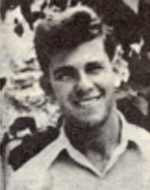Schechter, Moshe
Son of Zeev (Wolf) and Batsheva (Sabina). He was born on April 3, 1936, in the city of Grodok-Yaglonski, Poland. With the capture of Galicia by the Soviets, the father was arrested and sentenced to slave labor, and the mother and her children were deported to the Caucasus of Central Asia. Although the father was released in 1943 and drafted into the Red Army, he later fell in combat; A month before the father was drafted, the mother died of lack of bread and worry. Moshe was three and a half years old at the time and was in the shadow of Ukrainian farmers who did not know of his Jewishness. Moshe was six years old when he began his wanderings in Russia, but at the end of the war, with the movement of Polish refugees to the west, Moshe set out (together with his two older sisters). Around Cube they lingered and found their bread in coal trains. Only a year later they reached Bialyava in Poland, where they all entered the “Dror” children’s kibbutz. From there they continued to Germany to the empty monastery in Indersdorf – and Moshe at the age of ten. Where he met David Bogayevich (who fell in the course of his duty in the year 5707), and since then they did not part with the British, but after returning to Germany they immigrated to Israel and arrived there in 1948. He was a member of the “Oren” group of the children’s group there and completed his studies at the school and saw the kibbutz as his home Before joining the IDF in January 1955, he was involved in guiding children and youth in Rehovot in order to establish a branch “HaNoar HaOved”, which was dismantled earlier. On the fall of his good friend David Bogayevich, Moshe was no longer willing to remain outside the operations and demanded his release from the institutions of the movement and the economy so that he could devote himself to the army. After that, he joined the Nahal Brigade commander’s course and participated in the last operations. He fell in the battle for Husan on the 21st of Tishrei 5769 (26.9.1956) and was brought to rest in the cemetery in his kibbutz. Kibbutz Beit Hashita published a booklet entitled “Arnim Shnagdu” in memory of his friend David, whose memory and the memory of his friend were included in the pamphlet Tevet 5717 of “Pages” (information of the Department of Immigrant Absorption of Children and Youth published by the Jewish Agency in Jerusalem). It was also mentioned in Uri Milstein’s book “Wars of the Paratroopers”
